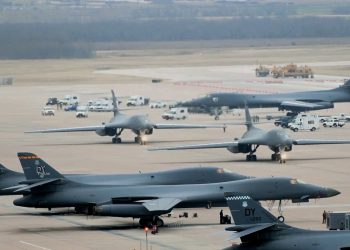Agence France-Presse,
Ottawa: Canadian fighter jets intercepted a Russian heavy bomber skirting Canada's Arctic frontier within 24 hours of US President Barack Obama visit to Ottawa last week, officials said Friday.
The Tupolev Bear strategic bomber and missile carrier did not enter Canadian airspace but came close enough for the North American Aerospace Defense Command (NORAD) to scramble two CF-18 fighter jets to ward it off, said Canadian Defense Minister Peter MacKay.
The CF-18 Hornets signaled to the Russian aircraft “to turn around, turn tail and head back to its own air space, which it did,” he said.
The incident occurred “within 24 hours” of President Obama's first foreign trip on February 19, and was viewed “very seriously” by Canada, MacKay told a press conference.
“I'm not going to stand here and accuse the Russians of having deliberately done this during the presidential visit,” he said. “But it was a strong coincidence.”
Moscow described the flight as a routine air patrol.
Vladimir Drik, an aide to Russia's chief of staff, was quoted as saying by the RIA Novosti news agency the crew acted solely within the limits of international air agreements and did not violate Canadian airspace.
Canadian Prime Minister Stephen Harper, however, expressed “deep concerns” over “increasingly aggressive Russian actions around the globe and Russian intrusions into our airspace.”
The US Pentagon would not comment on the incident.
Earlier, Peter MacKay met with Canada's Chief of the Defense Staff General Walt Natynczyk and General Gene Renuart, the commander of NORAD, to discuss the Canada-US air defense pact's modernization, boosting Canadian-US military interoperability and the expansion of NORAD surveillance to maritime approaches to the continent.
MacKay indicated beefed up Russian military activity near Canadian airspace in recent years has been noticed as Russia reasserts itself after the end of the Cold War.
“I think it's an example of the efforts being shown by the Russians to show their military capacity, maybe,” said MacKay. “That apparently includes coming close to and up to Canadian air space.
“But more seriously, it is an issue of sovereignty in the Arctic for Canadians,” he said, as global warming opens up the Arctic to navigation and oil and gas exploration.
In September, Canada said it was stepping up its military alertness along its northern frontier in response to Russia's “testing” of its boundaries.
Ottawa unveiled plans for a sensor net, navy patrols and a military training camp in the far north.
Five countries bordering the Arctic — Canada, Denmark, Norway, Russia and the United States — claim overlapping parts of the region, which is estimated to hold 90 billion untapped barrels of oil.
The United Nations Convention on the Law of the Sea (UNCLOS) stipulates that any coastal state can claim territory 200 nautical miles from their shoreline and exploit the natural resources within that zone.
Nations can also extend that limit to up to 350 nautical miles from their coast if they can provide scientific proof that the undersea continental plate is a natural extension of their territory.
Moscow said it should control the Northern Sea Route, a passage that stretches from Asia to Europe across northern Russia, and last year planted a flag on the ocean floor beneath the North Pole in a symbolic staking of its claim over the region.
Canada meanwhile has claimed the famed Northwest Passage.
“We will defend our airspace,” Harper said Friday. “We will defend our sovereignty and we will respond every time Russia makes an intrusion on the sovereignty of Canada's Arctic.”
MacKay added: “There is no heads up given by the Russians when they're going to undertake this type of activity. They simply show up on a radar screen.”
The Canadian defense minister said he has pressed his Russian counterpart and the Russian ambassador in Ottawa for advance notice of Russian flight operations near Canadian airspace, but to no avail.








